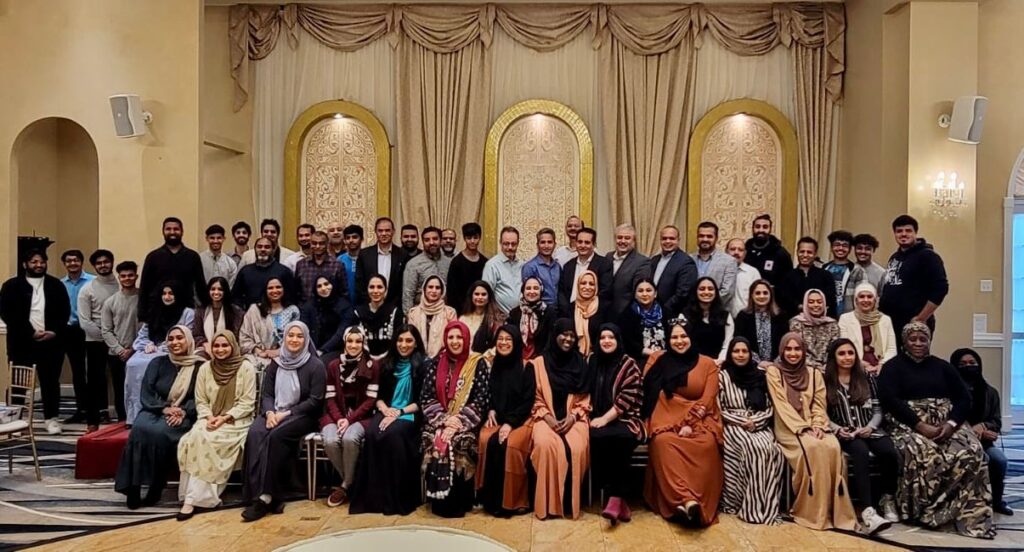The 59th and the first post-Covid in-person ISNA Convention garners an enthusiastic audience

By Rasheed Rabbi*
November/December
The ISNA annual convention’s in-person return to Chicago’s Donald Stephens Convention Center marked the milestone of forfeiting our two-year digital fatigue. Many speakers, attendees, sponsors, and others called it the best ISNA convention. With more than 175 speakers, 81 diverse sessions and workshops, 500 + bazaar booths, an interfaith banquet, CSRL banquet, nightly entertainment, hundreds of volunteers and more, this year’s ISNA convention provided a convoy of collaboration that put resilience into action beyond the published papers and discussion podiums.
CBS News (Sept. 3) described it as, “ISNA Convention in Rosemont [Convention Center] is nation’s largest gathering and networking event for the Muslim community.”
Attracting thousands of attendees, scores visited the bazaar’s 540 booths, as well the accompanying art exhibit, film festival, robotics, a women-only fashion show, gymnastics show, and matrimonial banquets. The convention ended with a volunteers’ appreciation luncheon.
Religious leaders and representatives, including ISNA president Safaa Zarzour, vice president Magda Elkadi Saleh, Mohammad Jalaluddin (ISNA VP, Canada), Irshad Khan (president, CIOGC) and Senator Fady Qaddoura (D-Ind.) spoke during the event’s opening day event.
The convention enabled the exchange of ideas, showcased social and outreach programs, provided networking opportunities, fostered interfaith interaction and good relations with other religious communities and encouraged civic engagements. Zarzour read President Joe Biden’s letter for the ISNA convention, endorsing ISNA’s efforts, on stage on Saturday night. U.S. Secretary of Education Miguel Cardona’s video message shared the work he has done alongside the Biden administration.
The heart-warming supplication of Capt. Saleha Jabeen, the first female Muslim U.S. Military chaplain, wove everyone together with the same thread of hope and commitment to work for finding a home in the U.S.
Rashad Hussain (U.S Ambassador-at-large for International Religious Freedom) highlighted some of his ongoing efforts at the government officials’ breakfast with political leaders, Homeland Security officials, and civic engagement and business leaders.
The annual Community Service Recognition Luncheon (CSRL) featured Ambassador Hussain as a keynote speaker and a virtual message from Dr. Seyyed Hossein Nasr (professor, Islamic studies, George Washington University), who received the community service recognition award.
Abdul Wahab received the ISNA President’s award for his outstanding service to the community and to ISNA. Medal of Freedom awardee Commissioner Khizr Khan talked about his life in U.S. for the last 40 years and the importance of interfaith work and civic engagement.
Recognizing the ISNA convention’s importance, ABC, CBS, the Chicago Sun Times and other national and international media outlets lent their platforms to disseminate the varied lessons of instilling resilience.
The convention addressed many critical issues, including instilling resilience in life’s transformative stages, offering a comprehensive curriculum for diverse audiences, and motivating people to put resilience into action.
Instilling Resilience in Life’s Transformative Stages
The convention’s 10 main sessions, which included a focused discussion forum, enabled the scholars to explain harnessing hope, acting with resilience and securing guidance through faith.
Waleed Basyouni (vice president, AlMaghrib Institute) urged emulating the Prophet (salla Allahu ‘alayhi wa sallam), who reflected his own optimism by changing Yathrib’s (blame and scolding) negative name to Medina (the city of God’s messenger), and noted that the fruit of prayer, when acting according to our faith, is hope. Muzammil Siddiqi, a former ISNA president, remarked that this life is a test (67:2, 29:2) and that our beliefs and actions will equip us to overcome them with hope and resilience. Mohammad Akram Nadwi (dean, Cambridge Islamic College; principal, Al-Salam Institute) referred to how prophets Noah, Ibrahim, Musa, ‘Isa and Muhammad harnessed hope.
The legacy of Shaykh Muhammad Shareef (founder, AlMaghrib Institute), who recently died aged 48, was commemorated during Friday’s second main session. Its speakers focused on his unique contributions that inspired hundreds to connect their faith with their life and embrace Islam comprehensively.
Friday’s final session focused on the family, the primary place in which to germinate the seeds of faith and sustain Islamic values. The family members’ ongoing and mutual impacts on one another require resiliency to ward off personal stresses or strains and to engender the homogenous flow of mutual harmony and stability. Hence, parents must maintain open communication with, as well as support, their children’s self-worth.
Saturday morning’s sessions started with the discussion of extending those universal virtues of coming together for weaving a loving and supportive community.
Highlighting suicide, addiction, and other perils, Dalia Mogahed (director of research, ISPU) emphasized the need for a stronger community. To build that community, Imam Mohammed Magid named three top tenets: compassion and mercy (21:107; 3:159; 55:1-4); serving the community; and consulting and collaborating with humility (49:13). Muzammil Siddique advocated for a mosque-centric community, for their closure during the pandemic revealed just how important they are as sources of God’s mercy and bring diverse people together.
A dedicated Saturday parallel session (#5A) was scheduled to elaborate upon Ihsan Bagby’s (associate professor, Islamic studies, University of Kentucky) national mosque report and work with Shaykh Muhammad Nur Abdullah (former ISNA president), Nisar-ul-Haq, Mogahed and Ahmad Al-Amin (imam and religious director, Indianapolis Muslim Community Association) to realize mosque-centric communities this vision.
While mosques arrange informal religious education, Islamic schools offer formal Islamic teaching. Session #4A celebrated these schools’ six-decade legacy. Saleh, who asserted that the mosque’s informal classrooms and halaqas are the base that motivates full-fledged Islamic educational institution, revealed that only 10% of Muslim American youth attend Islamic schools. Why? Because of the lack of adequate facilities and/or funding. She highlighted some of the common successes and concerns in this regard.
Jimmy Jones (professor and president, The Islamic Seminary of America) focused on the co-articulation of religious and ethnic/national traditions at a very young age and collaboration with non-Islamic schools, citing the joint venture the Prophet established among the Muhajireen and the Ansar to refine both cultures.
Some consider Islamic education a foreign concept. In response, Habeeb Quadri highlighted five Islamic constructs that, he opined, need to be integrated with each school, depending on the demographics: identity, knowledge, environment, relevance and community building.
The ideas and discussions around instilling resilience in life’s transformative stages were wrapped up beautifully in Saturday evening’s first session, which looked at the ethical responsibility of opposing discrimination, racism, Islamophobia, inequality and other social perils. Mogehad shared that she found a cathedral unaffected amidst the many destroyed mosques in Bosnia during the devastating homicide and drew the lesson that “the tormentors are not our teachers.” Jamila Karim dismissed the myth that African Americans are invisible Muslims by explaining that they diligently aspire to be the “walking Quran,” an approach that we often fail to understand.
The idea of resilience reached its apex during Saturday’s final session, the convention’s most attended event. Nadwi explained that communities need hope to arise, as well as hard work, open minds and hearts and full of belief in God, like Prophet Ibrahim. Shaykha Ieasha Prime (resident scholar and curriculum director, Islamic Society of Baltimore) brought home the theme by noting that our communities are already resilient, as they have survived a century of oppression, discrimination, inequality and Islamophobia. However, she stated, we need to raise the bar.
Imam Siraj Wahaj referred to prophets Muhammad and Ibrahim to unpack the lessons of resilience and perseverance. Imam Zaid Shakir mentioned that perseverance, not running away from hardship, builds character. We must commit ourselves to God, have hope and be persistent in the face of all challenges to raise the bar of resilience.
Sunday’s session addressed the other aspects of renewing resilience. Rania Awaad (clinical associate professor of psychiatry, Stanford University School of Medicine) shared some of the research conducted during the pandemic, when 40% of average Americans experienced depression. Imam Magid explained the theological emphasis on thinking positive.
The last main session was dedicated to equipping the youth at an early age. Mufti Hussain Kamani (instructor, Qalam Institute; faculty member, Qalam Seminary), Azhar Azeez (CEO, Muslim Aid USA; a former ISNA president), Prof. Hadia Mubarak (assistant professor of religion, Queens University of Charlotte; a former MSA president), Quadri and Zainedeen Abuhalimeh (president, MYNA) offered a very engaging discussion.
All of these sessions identified what fosters and hinders resilience — a basic trait for individual survival, interpersonal relationships, and social support.
Offering a Comprehensive Curriculum
While the main sessions provided a high-level perspective, parallel sessions offered a guided tour with all possible sub-avenues. For example, session 5A familiarized audiences with the vision of “Ideal mosques in America” and how to sustain it. Multiple full-length sessions explored Islamic finance in a time of hardship and inflation (#5D), investing in a volatile market (#13D) and Islamic home financing (#14D).
Sessions clarified Islamophobia in the U.S. (#6A) and China (#13E), discussed if Islam is being secularized to meet contemporary needs (#5C), how Muslim narratives have been changing in the film industry (#7D), the rise of Muslim television (#14B) and starting up a new technology firm or how technology’s rise can revive Quranic knowledge (#13C). Many others dealt with the struggles of American life and global crises (e.g., Kashmir, Bangladesh, Palestine and China).
During the CSRL luncheon, Amb. Hussain stated that Muslim Americans must envision an idealistic global identity not only to become fully aware of what’s happening in the world, but also to actively address these issues as best they can.
Motivating People to Put Resilience into Action
Despite the abundant scholarship on increasing resilience, especially post-pandemic, this convention was unique because the speakers and the attendees were able to create personal relationships. Recalling her extended family’s support for herself, her mother and two sisters after her father’s demise, Mogahed explained that ease comes “with” not “after” hardship” (94:5). Such a precise discussion revealed that we often remain inactive when it comes to transcending a hardship, and therefore miss out on enjoying the subsequent ease. Once we have the correct psychological mindset and undertake the required action, the ease will manifest itself.
Siraj Wahhaj (imam, Masjid Al-Taqwa, Brooklyn, N.Y.) shared the story of giving shahada to his 98-year-old mother just a few days before the convention. His account unfolded the various adversities that we may encounter in this country and to prepare ourselves accordingly. After sharing personal anecdotes, Iesha Prime explained that ease is “a victory by Allah” given after hardship; the tears of peoples’ struggle is witnessed by God and with hardship there will be ease.
Similar personal stories from Amb. Ebrahim Rasool, Jamila Karim and other speakers compelled us to contemplate our personal experiences to assess if we can demonstrate adequate resilience. Such introspection, infused with courage, will enable us to face any hardship and prepare strategies to transform stresses into resiliency.
Rasheed Rabbi, an IT professional who earned an MA in religious studies (2016) from Hartford Seminary and is pursuing a Doctor of Ministry from Boston University, is also founder of e-Dawah (www.edawah.net) and secretary of the Association of Muslim Scientists, Engineers & Technology Professionals. He serves as a khateeb and Friday prayer leader at the ADAMS Center and is a certified Muslim chaplain at iNova Fairfax, iNovaLoudoun and Virginia’s Alexandria and Loudoun Adult Detention Centers.
*With reporting by Rabiyah Syed, a student at Naperville Central who loves photography and aspires to be a speech pathologist.
Tell us what you thought by joining our Facebook community. You can also send comments and story pitches to horizons@isna.net. Islamic Horizons does not publish unsolicited material.
